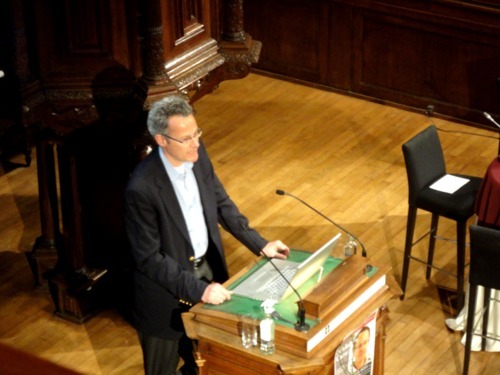Nicholas Carr in Amsterdam: “The Net Bombards Us With Distractions”
On March 2nd, author and journalist Nicholas Carr presented his new book “The Shallows: How the Internet is changing the way we think, read and remember” at the Universiteit van Amsterdam. After his famous 2008 essay “Is Google Making Us Stupid?”, Carr again makes his audience ponder on how contemporary technologies have an immense effect on the way people think.

The Mind in the Net
They are everywhere: Ipads, Ipods, mobile phones, wireless communication in various sizes and shapes. The Internet is heavily involved in our everyday life, and Nicholas Carr says it is shaping every single of our thought no matter where we go. In his new book “The Shallows: How the Internet is changing the way we think, read and remember”, he deals with technologies, how they change the way we think and how our brains adapt to how we retrieve information online. To make Carr’s long story short: we are no longer masters of our technology, but our technologies have overtaken mastery over us.
When talking about how he lost the ability to focus on one thing such as reading a book from cover to cover, Carr explains how he thinks that the human brain has the ability to regress with the intellectual technologies it is using. The Internet and its technologies as tools we are using to think with, to find, store, organize, analyze and share information and ideas with are, according to him, all about distractions. “The Net bombards us with distractions and interruptions” he emphasizes, pointing to Rodin’s sculpture of “The Thinker” which we can easily say good-bye to in the face of the interruption system named world wide web.
“The web is an interruption system. Computer technology trains us to have faster and faster responses and we are used to get immediate responses” Carr states, lamenting over how humans are constantly distracted by hyperlinks, messages and other interruptions when being online. Although he does not neglect the net’s feature of being a powerful technology in providing us with information of all kinds and enhancing connectivity, multiplicity, velocity and interactivity, he sees a radical change in our habits and therewith, a radical change in our brains and our ability to sense where we are. Just like the map or the watch shifted the way people think, the Internet has changed our attention span to the extent that we are merely “streaming” pages instead of attentively reading them.
“We carry our inbox with us all the time”
Carr states that we are in a perpetual state of distraction. No matter how many gains the Internet has to offer, be it new strengths in visual-spatial intelligence, information gathering, filtering, patterns of recognition, avenues of expression and collaboration, it weakens mindful knowledge acquisition, inductive analysis, critical thinking, imagination and reflection and our working memory is in a perpetual state of cognitive overload. So, even when you don’t click on the links that are flimmering online – your cognitive control goes down the hill and is lost in the ‘all-consuming screen’.
Now, is Carr holding on to old patterns of knowledge or are we seriously done with thinking deeply?
